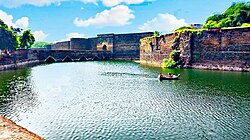Lohagarh Fort
| Lohagarh Fort | |
|---|---|
 Lohagarh Fort, Bharatpur | |
| Type | Historical Landmark |
| Location | Bharatpur, Rajasthan, India |
| Coordinates | 27°13′13.51″N 77°29′42.938″E / 27.2204194°N 77.49526056°E |
| Founder | Maharaja Suraj Mal |
Lohagarh Fort (transl. Iron Fort) is a fort located at Bharatpur in Rajasthan, India.[1] It stands as a testament to the strength and ingenuity of the Jat rulers of Bharatpur, particularly Maharaja Suraj Mal, who commissioned its construction in 1732.[2][3] The British army attempted 13 times to conquer this fort but they could not penetrate the fort even once out of 13 times.[4] The inaccessible Lohagarh fort could withstand repeated attacks of British forces led by Lord Lake during The Siege of Bharatpur in 1805 when they laid siege for over six weeks yet failed in all four attempts to storm the fortress.[5]
Between December 1825 and January 1826, British troops under Lord Combermere initially surrounded the state's capital until on 18 January 1826 its fortress was stormed and captured. After this siege, Bharatpur became princely state under British Raj control.[6]
Of the two gates in the fort, the one in the north is known as Ashtadhatu (eight metaled) gate while the one facing the south is called Chowburja (four-pillared) gate. Monuments in the fort include are Kishori Mahal, Mahal Khas, and Kothi Khas.
Jawahar Burj was built by Raja Jawahar Singh in 1765 to commemorate his victory over Mughals at Battle of Delhi (1764). Jawahar Burj was also used for the coronation ceremony of the rulers. Fateh Burj was built by Raja Ranjeet Singh in 1805 for the commemoration of his win over the British at the Siege of Bharatpur (1805).[7]
These parts of the Fort are granted the status of State Protected Monuments in Rajasthan – Kamara Khas, Kishori Mahal, Hansarani Mahal, Kachahari Kala, Chaman Bagichi, Hammam & mudwall gates i.e. Mathura gate, Binarain gate, Atal Bandh gate, Anah gate, Kumher gate, Govardhan gate, Neemda gate, Chandpol gate, and bastion near Suraj pol.
Following parts of Lohagarh Fort are recognized as Monuments of National Importance in Rajasthan - Jawahar Burj, Ashtadhatu Gateway, Moat surrounding the Fort wall, Fort walls including Chowburja gate and approach bridges at the Chowburja and Ashtadhatu gates.
References[edit]
- ^ Staff Reporter (11 February 2012). "Bharatpur's grandeur comes alive". The Hindu. ISSN 0971-751X. Retrieved 24 December 2018.
- ^ Singh, K. Natwar (2001). Maharaja Suraj Mal, 1707-1763. Rupa and Company. ISBN 9788171675104.
- ^ "भारत का वो किला, जिस पर तोप के गोले भी हो जाते थे बेअसर, अंग्रेजों ने भी मान ली थी हार". Amar Ujala (in Hindi). Retrieved 27 May 2024.
- ^ "भारत का वो किला, जिस पर तोप के गोले भी हो जाते थे बेअसर, अंग्रेजों ने भी मान ली थी हार". Amar Ujala (in Hindi). Retrieved 27 May 2024.
- ^ Dubey, Dinanath (2014). Bharat Ke Durg. Publications Division, M/O Information & Broadcasting, Govt. of India. ISBN 9788123018928.
- ^ "Siege of Bharatpur, 1825-1826". 5 May 2024.
- ^ Manohar, Dr. Raghvendra Singh (2019). Rajasthan ke Pramukh Durg. Rajasthan Hindi Granth Academy. ISBN 9789388776561.
External links[edit]
Further reading[edit]
- Dr. Prakash Chandra Chandawat: Maharaja Suraj Mal aur unka yug, Jaypal Agencies Agra, 1982
- Kunwar Natwar Singh: Maharaja Suraj Mal, 1707-1763 - His Life and Times, Publisher: Rupa, 2001, ISBN 978-81-7167-510-4
- Glimpses of Glorious Bharatpur: A Conspectus, 1945

